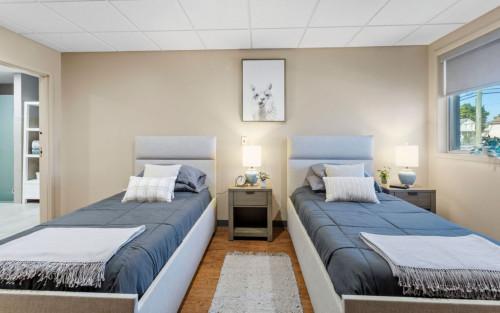
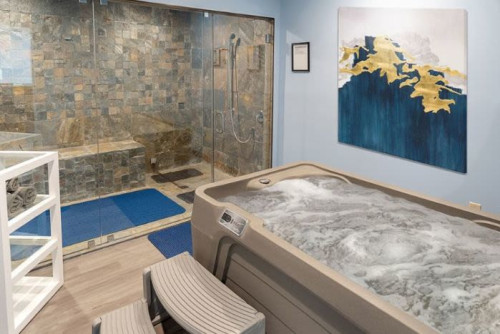
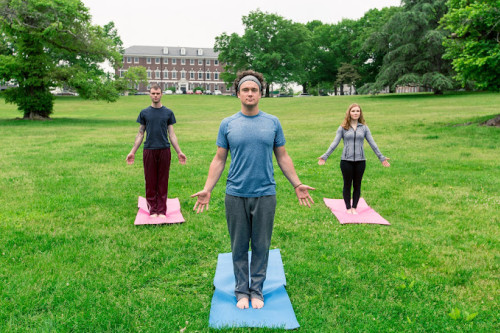

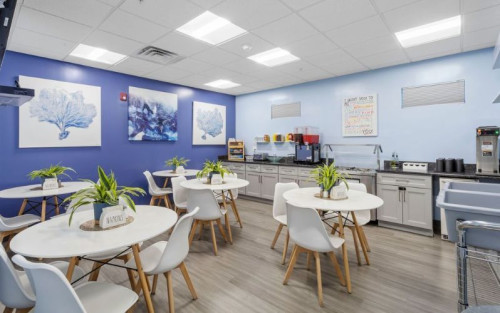




SOBA New Jersey Drug & Alcohol Rehab
Verified Center
This provider's information has been quality-checked by Recovery.com's Research Team for accuracy and completeness, including center verification through appropriate third-party organizations.
Treatment Focus
This center treats substance use disorders and mental health conditions. You'll receive individualized care catered to your unique situation and diagnosis, learn practical skills for recovery, and make new connections in a restorative environment.
Primary Level of Care
Offering intensive care with 24/7 monitoring, residential treatment is typically 30 days and can cover multiple levels of care. Length can range from 14 to 90 days typically.
Treatment Focus
This center treats substance use disorders and mental health conditions. You'll receive individualized care catered to your unique situation and diagnosis, learn practical skills for recovery, and make new connections in a restorative environment.
Primary Level of Care
Offering intensive care with 24/7 monitoring, residential treatment is typically 30 days and can cover multiple levels of care. Length can range from 14 to 90 days typically.
Provider's Policy
At SOBA New Jersey, we believe that high-quality addiction treatment services should be available to everyone who needs them, regardless of income. In an effort to make our addiction treatment programs more affordable, we offer several payment options and are in-network with leading health insurance providers like Cigna, BlueCross BlueShield, Magellan and Amerihealth. We currently do not accept Medicaid and Medicare. Other In-Network Insurances are Amerihealth, QualCare, Magellan.
SOBA New Jersey Drug & Alcohol Rehab
SOBA New Jersey Drug & Alcohol Rehab
About SOBA New Jersey Drug & Alcohol Rehab
SOBA New Jersey empowers clients to reclaim their lives through comprehensive addiction treatment and mental health services for adults struggling with a wide range of disorders. Clients build a strong foundation for long-term recovery by addressing their physical, emotional, and psychological well-being and the root cause of their condition. They offer detox, residential care, outpatient programs, and sober living for clients with substance use disorders, as well as primary and co-occurring mental health treatment.
Navigate Recovery with a 3-Phase Plan
SOBA’s 3-phase recovery model guides clients from detox to long-term independence. Clients begin with medically supervised detox and 24/7 support for safe withdrawal. Residential treatment follows, offering individual and group therapy, trauma care, and wellness therapies in a structured setting. The final phase focuses on reintegration, providing relapse prevention strategies, outpatient care, and sober living options for long-term success.
Heal with Culturally Relevant Care
SOBA provides culturally competent care for Orthodox Jewish clients, trauma-informed support for veterans and first responders, and an affirming LGBTQ+ program. Every client receives customized care, using biopsychosocial assessments and evidence-based therapies like one-on-one counseling, family therapy, and eye movement desensitization and reprocessing (EMDR) for trauma. Clients also benefit from holistic approaches such as mindfulness, wellness coaching, and adventure therapy.
Recover in a Peaceful and Restorative Environment
At SOBA’s residential center, clients experience a balanced lifestyle that supports healing and growth. When not in treatment, clients enjoy chef-prepared gourmet meals, time in the gym, and relaxing in the sauna, Jacuzzi, and large pool. With fully furnished accommodations, high-speed WiFi, cable TV, and housekeeping, clients can rest well and focus on recovery. SOBA also offers free transportation to their facilities for clients within a 5-hour radius.

Highlights from the Center
Highlights
These highlights are provided by and paid for by the center.
Perfect for Professionals
On-site Medical Detox
Tech Friendly
Trauma Treatment
Center Overview
Treatment Focus
This center treats substance use disorders and mental health conditions. You'll receive individualized care catered to your unique situation and diagnosis, learn practical skills for recovery, and make new connections in a restorative environment.
Joint Commission Accredited
The Joint Commission accreditation is a voluntary, objective process that evaluates and accredits healthcare organizations (like treatment centers) based on performance standards designed to improve quality and safety for patients. To be accredited means the treatment center has been found to meet the Commission's standards for quality and safety in patient care.
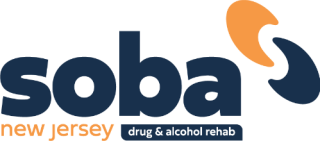
SOBA New Jersey Drug & Alcohol Rehab
Insurance Accepted
Cash Pay Rates
Estimated Cash Pay Rate
Center pricing can vary based on program and length of stay. Contact the center for more information. Recovery.com strives for price transparency so you can make an informed decision.




Recovery.com Verified Listing
Recovery.com verified that the name, location, contact information and license to operate for this treatment provider are valid and up-to-date.

Joint Commission Accredited

Licensed
Recovery.com is an independent, third-party mental health resource. Verification does not imply endorsement and does not guarantee the quality of treatment services.
Meet Your Care Team

Jessica Wright
Administrator and Director of Clinical Services
MA, LPC, LCADC, NCGC-I, ACS

Samantha Sweeney
Director of Clinical Services- Outpatient
MA, LPC, NCC, LCADC

Jeffrey Berman
Medical Director

David Martin
Clinician

Donna Saunders
Clinician
MSW, LSW, CADC, Credentialed Intern

Leigh Fagerstrom
Clinician
MSW, LSW, CADC, Credentialed Intern

Julie Deluca
Care Coordinator Manager
CADC Intern

Freda Moore-Abdus Salaam
Client Care Coordinator Manager

Wilfred Asamoah
Primary Therapist
LSW, CADC Intern

Magaly Irineo
Group Facilitator
MSW, CADC Intern

Kayla Walters
Recovery Technician

Annette Kuilan
Recovery Technician
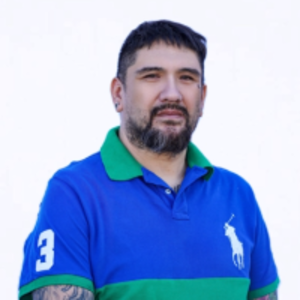
Joseph Nogueira
Recovery Technician

Scott Ketschke
Recovery Technician

Orlando Gonzalez
Chef
Supportive Medication for Recovery
Medication-Assisted Treatment (MAT) is an evidence-based approach that pairs FDA-approved medications with counseling to treat addiction. The medications are used to reduce cravings, ease withdrawal symptoms, or block the effects of substances. More about MAT
Methadone
Naltrexone
Buprenorphine
Note: Treatment centers offer different forms of MAT—such as oral tablets, dissolvable films, or monthly injections—and their policies can vary based on state regulations, provider preferences, and insurance coverage. Because of these differences, it's best to contact the center directly to learn what options are available and what might be right for your situation.
Your Care Options
Specializations
Alcohol
Using alcohol as a coping mechanism, or drinking excessively throughout the week, signals an alcohol use disorder.
Anxiety
Anxiety is a common mental health condition that can include excessive worry, panic attacks, physical tension, and increased blood pressure.
Bipolar
This mental health condition is characterized by extreme mood swings between depression, mania, and remission.
Co-Occurring Disorders
A person with multiple mental health diagnoses, such as addiction and depression, has co-occurring disorders also called dual diagnosis.
Cocaine
Cocaine is a stimulant with euphoric effects. Agitation, muscle ticks, psychosis, and heart issues are common symptoms of cocaine abuse.
Depression
Symptoms of depression may include fatigue, a sense of numbness, and loss of interest in activities. This condition can range from mild to severe.
Trauma
Some traumatic events are so disturbing that they cause long-term mental health problems. Those ongoing issues can also be referred to as "trauma."
Who We Treat
Executives
Executive treatment programs typically directly support the needs of people who manage businesses and may provide flexible schedules and office space to allow work during treatment.
Young Adults
Emerging adults ages 18-25 receive treatment catered to the unique challenges of early adulthood, like college, risky behaviors, and vocational struggles.
LGBTQ+
Addiction and mental illnesses in the LGBTQ+ community must be treated with an affirming, safe, and relevant approach, which many centers provide.
Men and Women
Men and women attend treatment for addiction in a co-ed setting, going to therapy groups together to share experiences, struggles, and successes.
Midlife Adults
For adults ages 40+, treatment shifts to focus on the unique challenges, blocks, and risk factors of their age group, and unites peers in a similar community.
Professionals
Busy, high-ranking professionals get the personalized treatment they need with greater accommodations for work, privacy, and outside communication.
Veterans
Patients who completed active military duty receive specialized treatment focused on trauma, grief, loss, and finding a new work-life balance.
Treatment Services
Day Treatment
In a PHP, patients live at home but follow an intensive schedule of treatment. Most programs require you to be on-site for about 40 hours per week.
Detox
Detox fully and safely removes toxic substances from the body, allowing the next steps in treatment to begin with a clean slate.
Detox (on-site with residential)
This is often the first step of addiction treatment. For many people, it's dangerous to detox without proper medical support.
Intensive Family Program
Some rehabs offer intensive programs for loved ones. Group and individual therapy sessions help everyone heal, and improve family dynamics.
Intensive Outpatient Program
In an IOP, patients live at home or a sober living, but attend treatment typically 9-15 hours a week. Most programs include talk therapy, support groups, and other methods.
Licensed Primary Mental Health
Some primary care providers offer mental health diagnosis and treatment. This can prevent patients from developing more serious conditions.
Outpatient
During outpatient rehab, patients attend a structured treatment program while continuing to live at home.
Residential
In a residential rehab program, patients live onsite, with access to daily treatment and 24-hour care. An average stay is 30-90 days.
Approaches
Evidence-Based
A combination of scientifically rooted therapies and treatments make up evidence-based care, defined by their measured and proven results.
Family Involvement
Providers involve family in the treatment of their loved one through family therapy, visits, or both–because addiction is a family disease.
Personalized Treatment
The specific needs, histories, and conditions of individual patients receive personalized, highly relevant care throughout their recovery journey.
Therapies
1-on-1 Counseling
Patient and therapist meet 1-on-1 to work through difficult emotions and behavioral challenges in a personal, private setting.
Play Therapy
This approach is commonly used with children. It incorporates elements of play and self-expression, like boardgames, finger painting, dolls, and blocks.
Online Therapy
Patients can connect with a therapist via videochat, messaging, email, or phone. Remote therapy makes treatment more accessible.
Rational Emotive Behavior Therapy
A type of cognitive therapy that identifies negative self-defeating thoughts and behaviors, rewriting beliefs to be positive, empowering, and present.
Mindfulness Therapy
This ancient practice can be mental, emotional, and even spiritual. In meditation, you focus your attention on the present moment without judgement.
Adventure Therapy
This experiential approach uses the physical and emotional challenges of outdoor activities as tools for personal growth.
Animal Therapy
Animals can inspire trust and self-worth. In this experiential therapy, guided interactions are used to improve social skills and emotion regulation.
Conditions We Treat
Personality Disorders
Personality disorders destabilize the way a person thinks, feels, and behaves. If untreated, they can undermine relationships and lead to severe distress.
Anxiety
Anxiety is a common mental health condition that can include excessive worry, panic attacks, physical tension, and increased blood pressure.
Bipolar
This mental health condition is characterized by extreme mood swings between depression, mania, and remission.
Depression
Symptoms of depression may include fatigue, a sense of numbness, and loss of interest in activities. This condition can range from mild to severe.
Post Traumatic Stress Disorder
PTSD is a long-term mental health issue caused by a disturbing event or events. Symptoms include anxiety, dissociation, flashbacks, and intrusive thoughts.
Trauma
Some traumatic events are so disturbing that they cause long-term mental health problems. Those ongoing issues can also be referred to as "trauma."
Substances We Treat
Alcohol
Using alcohol as a coping mechanism, or drinking excessively throughout the week, signals an alcohol use disorder.
Benzodiazepines
Benzodiazepines are prescribed to treat anxiety and sleep issues. They are highly habit forming, and their abuse can cause mood changes and poor judgement.
Chronic Relapse
Consistent relapse occurs repeatedly, after partial recovery from addiction. This condition requires long-term treatment.
Co-Occurring Disorders
A person with multiple mental health diagnoses, such as addiction and depression, has co-occurring disorders also called dual diagnosis.
Cocaine
Cocaine is a stimulant with euphoric effects. Agitation, muscle ticks, psychosis, and heart issues are common symptoms of cocaine abuse.
Drug Addiction
Drug addiction is the excessive and repetitive use of substances, despite harmful consequences to a person's life, health, and relationships.
Ecstasy
Ecstasy is a stimulant that causes intense euphoria and heightened awareness. Abuse of this drug can trigger depression, insomnia, and memory problems.
Heroin
Heroin is a highly addictive and illegal opioid. It can cause insomnia, collapsed veins, heart issues, and additional mental health issues.
Languages
Aftercare
Care Designed for Your Needs
Personal Amenities
Amenities
Special Considerations
Executive Program
Addiction and mental health treatment for executives typically involves high discretion, greater technology access, and more private, 1-on-1 care.
Flexible technology policies
Centers with flexible technology policies allow professionals to stay in touch with work and give patients a greater sense of connection and normalcy.
Gender-specific groups
Patients in gender-specific groups gain the opportunity to discuss challenges unique to their gender in a comfortable, safe setting conducive to healing.
Activities
Yoga
Yoga is both a physical and spiritual practice. It includes a flow of movement, breathing techniques, and meditation.
Off-Site Activities
Yoga
Yoga is both a physical and spiritual practice. It includes a flow of movement, breathing techniques, and meditation.
Off-Site Amenities
Learn More About the Center
SOBA in the Spotlight
Discover how SOBA’s impact transforms lives through advocacy, expert insights, and community outreach.
Guide Loved Ones to Recovery
Learn how expert-led interventions can help a loved one accept treatment and begin healing.
SOBA's Supportive Housing
Explore how supportive housing provides stability, accountability, and community for lasting recovery success.
Convenient Recovery Support via Telehealth
Access expert addiction and mental health care from home with SOBA’s secure telehealth services.
What people are saying
Treatment
4.9
Accommodations
5.0
Food & Nutrition
4.9
Value
5.0
Pros
- Luxurious Accommodations (7)
- Gourmet & Nutritious Food (7)
- Friendly & Competent Staff (7)
- Supportive Aftercare (7)
Cons
- Poor Cell Service (2)
M S
Treatment in 2022 • (60 days) • Reviewed 04/07/23
Former Client
•Contractor
•Cherry Hill
BV
Treatment in 2022 • (90 days) • Reviewed 01/04/23
Former Client
•Teacher
•bergen county New Jersey
JG
Treatment in 2022 • (60 days) • Reviewed 01/10/23
Former Client
•HR admin
•Sea Bright New Jersey
RM
Treatment in 2023 • (60 days) • Reviewed 12/05/23
Former Client
•Lawyer
LR
Treatment in 2023 • (30 days) • Reviewed 06/20/23
Former Client
•Teacher
•Montville NJ












